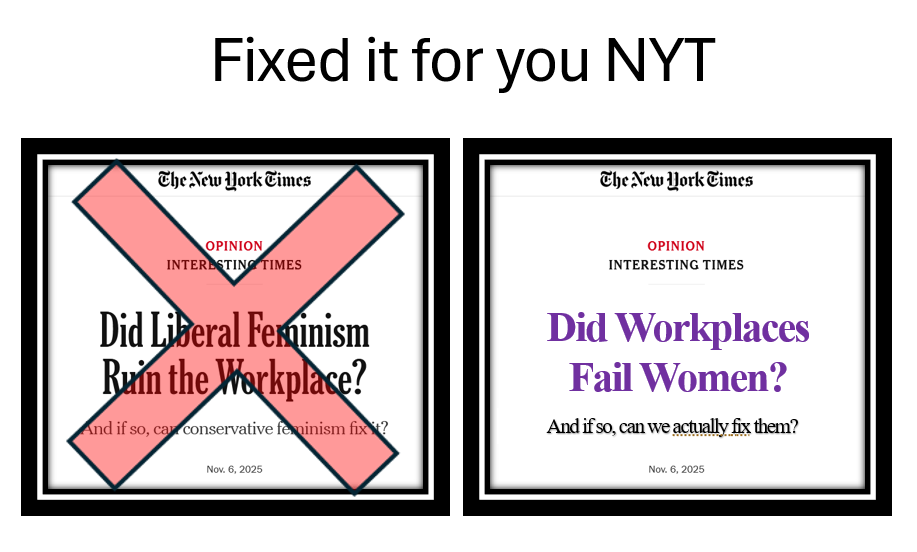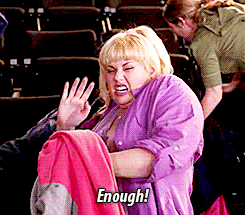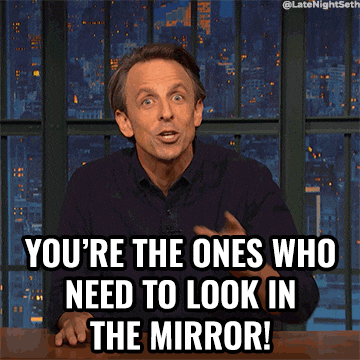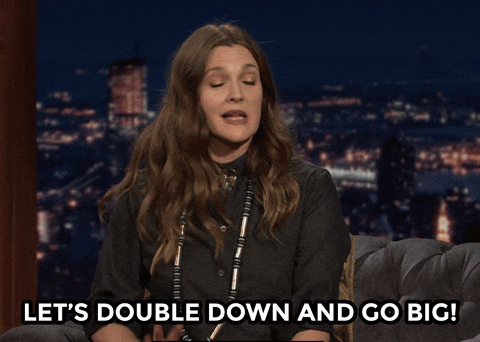The Audacity of Asking the Wrong Question
So the New York Times wants to know if clickbait will make them relevant again… and also if women ruined the workplace. 🤮🙄
Let me save you an hour-long podcast: No. The workplace isn’t broken because women are in it. It’s broken because it was only ever designed to work for some of us.
But since we’re asking questions, here are some better ones:
Why Haven’t Workplaces Evolved to Accommodate Their Entire Workforce?
Workplaces were designed for Ward Cleaver. You know, the guy whose wife handled literally everything at home while he focused 100% on work. That worker is basically extinct, yet we’re still running the same play over and over again (insanity).
The real question isn’t “did women ruin the workplace?” It’s “why are we still pretending June Cleaver is home baking pot roast while everyone’s actually at work?”
When HALF the workforce shows up and the infrastructure hasn’t budged, that’s a design failure.
How Did Workplace Design Failures Create the Conditions for #MeToo?
#MeToo didn’t create workplace problems. It exposed them.
For decades, workplaces built exactly zero functional systems for dealing with harassment. No real reporting mechanisms. No consequences for abusers. No protection for victims. They just... let it ride. And when women finally said “enough,” suddenly they’re the problem?
Imagine if your smoke detector went off and you blamed the detector instead of, you know, the fire.
Ask yourself: Why were so many workplaces structured to protect harassers rather than workers? And why are we calling accountability “feminization” instead of “basic professionalism”?
Why Do We Still Design Workplaces Around 1950s Family Structures?
The idea that childcare is solely a woman’s problem is what’s actually broken here.
When workplaces refuse to offer parental leave, flexible schedules, or affordable childcare, they’re not being “neutral.” They’re actively requiring that someone (women) stays home or cobbles together an impossible juggling act.
Then they have the nerve to suggest women should “preemptively limit their careers” because workplaces refuse to accommodate the biological reality that humans reproduce and raise children.
What if workplaces just... adapted? Like businesses do with every other major societal change.
What Do Workplaces Lose When They Resist Accountability Cultures?
The “wokeness” complaints? That’s people mad about consequences pretending it’s about principles. When you implement actual accountability – clear standards, fair processes, consequences for misconduct – some people get all up in their feelings about it. Specifically, the people who benefited from the lack of accountability.
Professional workplaces require professional standards. That’s not “feminization.” That’s called having a functional organization.
Would you want to work somewhere with no anti-harassment policies, no oversight, and no recourse if someone treats you like garbage? Or does that only sound appealing when you’re not the one getting ground up?
What If The Masculine Workplace Only Worked Because of Who It Excluded?
That old workplace “worked” because it didn’t count the costs borne by everyone it excluded.
It didn’t count:
The women forced out due to harassment
The talent lost because flexibility didn’t exist
The parents (mostly mothers) pushed out because “work-life balance” was treated like a character flaw
The mental health crises from toxic cultures
The good ideas that never happened because everyone in the room looked and thought the same
When you only measure success by the comfort level of one demographic, sure, everything looks great. For that demographic.
The rest of us were busy keeping receipts.
So Let’s Ask Better Questions
Instead of “did women ruin the workplace,” how about:
Why do workplaces still operate as if everyone has a 1950s housewife at home?
Why do we frame accountability as a problem instead of a baseline requirement?
Why is psychological safety considered “feminine” and therefore suspicious?
Why do we treat flexibility and support as special accommodations rather than good management?
Why are we more comfortable questioning women’s right to exist in workplaces than questioning why workplaces are so inflexible and hostile?
The problem isn’t that women showed up. The problem is that workplaces were never required to be hospitable to half the population in the first place, and a whole lot of people would like to keep it that way.
That’s not a gender problem. That’s a power problem.
And if demanding equal pay, parental leave, and not being sexually harassed at work is “ruining” things?
Then ladies, I say we double down. Ruin it harder.








